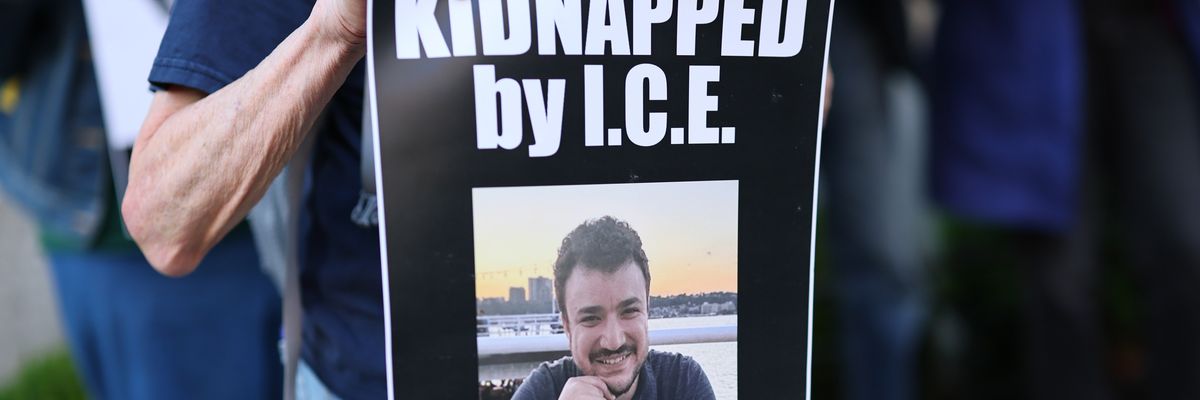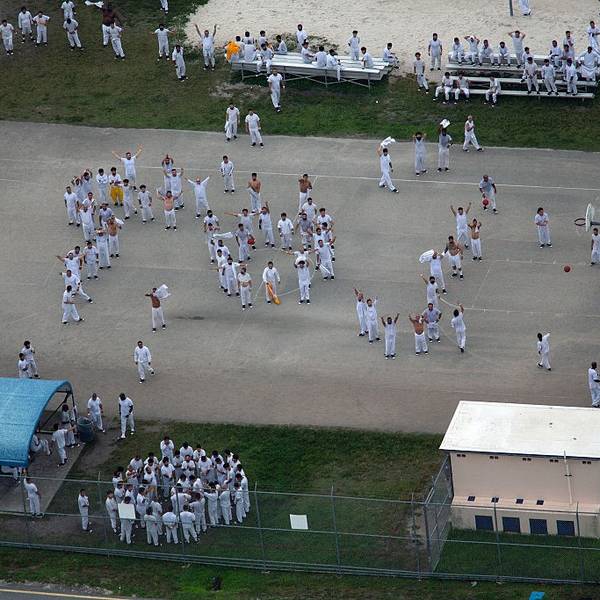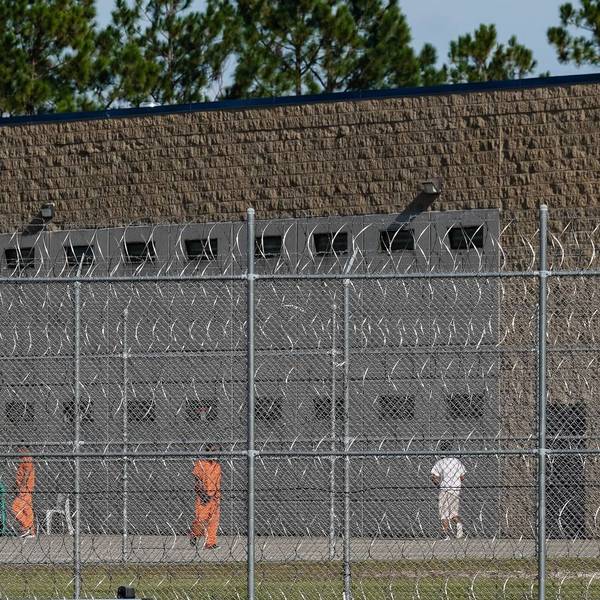
A protester holds a photo of Columbia University student organizer Mahmoud Khalil as demonstrators gather to protest against the deportation of immigrants to El Salvador on April 24, 2025 in New York City.
Judge Rules Trump Admin's Detention of Mahmoud Khalil 'Likely' Unconstitutional
"Every day Mahmoud spends languishing in an ICE detention facility in Jena, Louisiana, is an affront to justice, and we won't stop working until he is free," said Khalil's legal team.
Former Columbia University student protester Mahmoud Khalil remained in detention in Louisiana Thursday even after a ruling by a federal judge who found that his imprisonment by Trump immigration officials is "likely" unconstitutional—but his attorneys expressed hope that the decision brought Khalil a step closer to being reunited with his wife and newborn son.
U.S. District Court Judge Michael Farbiarz in New Jersey ruled that Secretary of State Marco Rubio has likely violated constitutional law in his attempt to use Section 1227 of the U.S. Code to remove Khalil from the United States.
Rubio first claimed that Khalil's involvement in student protests supporting Palestinian rights last year threatened U.S. foreign policy interests, and then alleged that Khalil committed fraud by not disclosing information about his past work with the Syria Office at the British Embassy in Beirut and with the United Nations Relief and Works Agency for Palestine Refugees (UNRWA), an agency that has long received U.S. funding to provide aid to Palestinians in Gaza.
Calling the administration's pursuit of Khalil's deportation "unprecedented," Farbiarz wrote, "The issue now before the court has been this: Does the Constitution allow the Secretary of State to use Section 1227, as applied through the determination, to try to remove the petitioner from the United States? The court's answer: likely not."
"If Section 1227 can apply, here, to the petitioner, then other, similar statutes can also one day be made to apply," the judge added. "Not just in the removal context, as to foreign nationals. But also in the criminal context, as to everyone."
But Farbiarz called on Khalil's legal team to provide more information pertaining to the government's accusations against him regarding his immigration application, and declined to issue a preliminary injunction to release Khalil on bail—or to move him from an Immigration and Customs Enforcement detention center in Jena, Louisiana to one in New Jersey where he would be closer to his wife and son.
The judge wrote that his finding "does not entitle [Khalil] to a preliminary injunction. He has not put before the court evidence as to the various other things he must prove... before an injunction might issue... The court will give the petitioner a chance to quickly fill out the record, and for the respondents to then weigh in."
Khalil is being represented by groups including the ACLU, the Center for Constitutional Rights, the ACLU of New Jersey, and several legal firms. His legal team said that Farbiarz "held what we already knew: Secretary Rubio's weaponization of immigration law to punish Mahmoud and others like him is likely unconstitutional."
"We will work as quickly as possible to provide the court the additional information it requested supporting our effort to free Mahmoud or otherwise return him to his wife and newborn son," said the team. "Every day Mahmoud spends languishing in an ICE detention facility in Jena, Louisiana, is an affront to justice, and we won't stop working until he is free."
Khalil was informed by immigration agents who detained him outside his Columbia University-owned apartment in March that his green card had been revoked, before they took him in an unmarked vehicle to a detention center in New Jersey. He was then transferred 1,400 miles away to Jena where he's been separated from his legal counsel as well as his family
An immigration judge in Louisiana ruled last month that the administration can pursue Khalil's deportation. The case in New Jersey is challenging his detention on the grounds that his constitutional free speech and due process rights have been violated.
Several other international students who have been detained for supporting Palestinian rights—and opposing Israel's U.S.-backed assault on Gaza—have been released from detention in recent weeks.
Elora Mukherjee, a professor at Columbia Law School, said Farbiarz's ruling was "a victory in terms of the court recognizing that the targeting of Mahmoud Khalil based on his protected speech violates the due process protection he should be afforded under the Constitution."
"People around the world are watching to see what is happening in Mahmoud Khalil's case as one of the most prominent examples of the Trump administration taking actions against international students in the United States," Mukherjee told The Washington Post. "And I think the biggest takeaway that people will see is that he is still in detention in Louisiana, separated from his wife and his newborn baby and having missed his graduation. It is a symbol of the hostility of the executive branch to international students and lawful permanent residents right now."
An Urgent Message From Our Co-Founder
Dear Common Dreams reader, The U.S. is on a fast track to authoritarianism like nothing I've ever seen. Meanwhile, corporate news outlets are utterly capitulating to Trump, twisting their coverage to avoid drawing his ire while lining up to stuff cash in his pockets. That's why I believe that Common Dreams is doing the best and most consequential reporting that we've ever done. Our small but mighty team is a progressive reporting powerhouse, covering the news every day that the corporate media never will. Our mission has always been simple: To inform. To inspire. And to ignite change for the common good. Now here's the key piece that I want all our readers to understand: None of this would be possible without your financial support. That's not just some fundraising cliche. It's the absolute and literal truth. We don't accept corporate advertising and never will. We don't have a paywall because we don't think people should be blocked from critical news based on their ability to pay. Everything we do is funded by the donations of readers like you. Will you donate now to help power the nonprofit, independent reporting of Common Dreams? Thank you for being a vital member of our community. Together, we can keep independent journalism alive when it’s needed most. - Craig Brown, Co-founder |
Former Columbia University student protester Mahmoud Khalil remained in detention in Louisiana Thursday even after a ruling by a federal judge who found that his imprisonment by Trump immigration officials is "likely" unconstitutional—but his attorneys expressed hope that the decision brought Khalil a step closer to being reunited with his wife and newborn son.
U.S. District Court Judge Michael Farbiarz in New Jersey ruled that Secretary of State Marco Rubio has likely violated constitutional law in his attempt to use Section 1227 of the U.S. Code to remove Khalil from the United States.
Rubio first claimed that Khalil's involvement in student protests supporting Palestinian rights last year threatened U.S. foreign policy interests, and then alleged that Khalil committed fraud by not disclosing information about his past work with the Syria Office at the British Embassy in Beirut and with the United Nations Relief and Works Agency for Palestine Refugees (UNRWA), an agency that has long received U.S. funding to provide aid to Palestinians in Gaza.
Calling the administration's pursuit of Khalil's deportation "unprecedented," Farbiarz wrote, "The issue now before the court has been this: Does the Constitution allow the Secretary of State to use Section 1227, as applied through the determination, to try to remove the petitioner from the United States? The court's answer: likely not."
"If Section 1227 can apply, here, to the petitioner, then other, similar statutes can also one day be made to apply," the judge added. "Not just in the removal context, as to foreign nationals. But also in the criminal context, as to everyone."
But Farbiarz called on Khalil's legal team to provide more information pertaining to the government's accusations against him regarding his immigration application, and declined to issue a preliminary injunction to release Khalil on bail—or to move him from an Immigration and Customs Enforcement detention center in Jena, Louisiana to one in New Jersey where he would be closer to his wife and son.
The judge wrote that his finding "does not entitle [Khalil] to a preliminary injunction. He has not put before the court evidence as to the various other things he must prove... before an injunction might issue... The court will give the petitioner a chance to quickly fill out the record, and for the respondents to then weigh in."
Khalil is being represented by groups including the ACLU, the Center for Constitutional Rights, the ACLU of New Jersey, and several legal firms. His legal team said that Farbiarz "held what we already knew: Secretary Rubio's weaponization of immigration law to punish Mahmoud and others like him is likely unconstitutional."
"We will work as quickly as possible to provide the court the additional information it requested supporting our effort to free Mahmoud or otherwise return him to his wife and newborn son," said the team. "Every day Mahmoud spends languishing in an ICE detention facility in Jena, Louisiana, is an affront to justice, and we won't stop working until he is free."
Khalil was informed by immigration agents who detained him outside his Columbia University-owned apartment in March that his green card had been revoked, before they took him in an unmarked vehicle to a detention center in New Jersey. He was then transferred 1,400 miles away to Jena where he's been separated from his legal counsel as well as his family
An immigration judge in Louisiana ruled last month that the administration can pursue Khalil's deportation. The case in New Jersey is challenging his detention on the grounds that his constitutional free speech and due process rights have been violated.
Several other international students who have been detained for supporting Palestinian rights—and opposing Israel's U.S.-backed assault on Gaza—have been released from detention in recent weeks.
Elora Mukherjee, a professor at Columbia Law School, said Farbiarz's ruling was "a victory in terms of the court recognizing that the targeting of Mahmoud Khalil based on his protected speech violates the due process protection he should be afforded under the Constitution."
"People around the world are watching to see what is happening in Mahmoud Khalil's case as one of the most prominent examples of the Trump administration taking actions against international students in the United States," Mukherjee told The Washington Post. "And I think the biggest takeaway that people will see is that he is still in detention in Louisiana, separated from his wife and his newborn baby and having missed his graduation. It is a symbol of the hostility of the executive branch to international students and lawful permanent residents right now."
- Judge to Trump DHS: Justify Deporting Khalil or 'I'm Going to Terminate This Case' ›
- After 'Heartless' ICE Refusal, Judge Orders Officials to Allow Mahmoud Khalil to See His Family ›
- 'Very Dark Stuff': Judge Rules Palestine Activist Mahmoud Khalil Can Be Deported ›
- Mahmoud Khalil Team Files FOIA Request to Expose Trump Collusion With Anti-Palestinian 'Agents of Repression' | Common Dreams ›
- Judge: Trump Admin Can't Hold or Deport Mahmoud Khalil 'On Rubio's Say-So' | Common Dreams ›
- Trump Asylum Crackdown Dealt Major Blow in 'Hugely Important' Court Ruling | Common Dreams ›
Former Columbia University student protester Mahmoud Khalil remained in detention in Louisiana Thursday even after a ruling by a federal judge who found that his imprisonment by Trump immigration officials is "likely" unconstitutional—but his attorneys expressed hope that the decision brought Khalil a step closer to being reunited with his wife and newborn son.
U.S. District Court Judge Michael Farbiarz in New Jersey ruled that Secretary of State Marco Rubio has likely violated constitutional law in his attempt to use Section 1227 of the U.S. Code to remove Khalil from the United States.
Rubio first claimed that Khalil's involvement in student protests supporting Palestinian rights last year threatened U.S. foreign policy interests, and then alleged that Khalil committed fraud by not disclosing information about his past work with the Syria Office at the British Embassy in Beirut and with the United Nations Relief and Works Agency for Palestine Refugees (UNRWA), an agency that has long received U.S. funding to provide aid to Palestinians in Gaza.
Calling the administration's pursuit of Khalil's deportation "unprecedented," Farbiarz wrote, "The issue now before the court has been this: Does the Constitution allow the Secretary of State to use Section 1227, as applied through the determination, to try to remove the petitioner from the United States? The court's answer: likely not."
"If Section 1227 can apply, here, to the petitioner, then other, similar statutes can also one day be made to apply," the judge added. "Not just in the removal context, as to foreign nationals. But also in the criminal context, as to everyone."
But Farbiarz called on Khalil's legal team to provide more information pertaining to the government's accusations against him regarding his immigration application, and declined to issue a preliminary injunction to release Khalil on bail—or to move him from an Immigration and Customs Enforcement detention center in Jena, Louisiana to one in New Jersey where he would be closer to his wife and son.
The judge wrote that his finding "does not entitle [Khalil] to a preliminary injunction. He has not put before the court evidence as to the various other things he must prove... before an injunction might issue... The court will give the petitioner a chance to quickly fill out the record, and for the respondents to then weigh in."
Khalil is being represented by groups including the ACLU, the Center for Constitutional Rights, the ACLU of New Jersey, and several legal firms. His legal team said that Farbiarz "held what we already knew: Secretary Rubio's weaponization of immigration law to punish Mahmoud and others like him is likely unconstitutional."
"We will work as quickly as possible to provide the court the additional information it requested supporting our effort to free Mahmoud or otherwise return him to his wife and newborn son," said the team. "Every day Mahmoud spends languishing in an ICE detention facility in Jena, Louisiana, is an affront to justice, and we won't stop working until he is free."
Khalil was informed by immigration agents who detained him outside his Columbia University-owned apartment in March that his green card had been revoked, before they took him in an unmarked vehicle to a detention center in New Jersey. He was then transferred 1,400 miles away to Jena where he's been separated from his legal counsel as well as his family
An immigration judge in Louisiana ruled last month that the administration can pursue Khalil's deportation. The case in New Jersey is challenging his detention on the grounds that his constitutional free speech and due process rights have been violated.
Several other international students who have been detained for supporting Palestinian rights—and opposing Israel's U.S.-backed assault on Gaza—have been released from detention in recent weeks.
Elora Mukherjee, a professor at Columbia Law School, said Farbiarz's ruling was "a victory in terms of the court recognizing that the targeting of Mahmoud Khalil based on his protected speech violates the due process protection he should be afforded under the Constitution."
"People around the world are watching to see what is happening in Mahmoud Khalil's case as one of the most prominent examples of the Trump administration taking actions against international students in the United States," Mukherjee told The Washington Post. "And I think the biggest takeaway that people will see is that he is still in detention in Louisiana, separated from his wife and his newborn baby and having missed his graduation. It is a symbol of the hostility of the executive branch to international students and lawful permanent residents right now."
- Judge to Trump DHS: Justify Deporting Khalil or 'I'm Going to Terminate This Case' ›
- After 'Heartless' ICE Refusal, Judge Orders Officials to Allow Mahmoud Khalil to See His Family ›
- 'Very Dark Stuff': Judge Rules Palestine Activist Mahmoud Khalil Can Be Deported ›
- Mahmoud Khalil Team Files FOIA Request to Expose Trump Collusion With Anti-Palestinian 'Agents of Repression' | Common Dreams ›
- Judge: Trump Admin Can't Hold or Deport Mahmoud Khalil 'On Rubio's Say-So' | Common Dreams ›
- Trump Asylum Crackdown Dealt Major Blow in 'Hugely Important' Court Ruling | Common Dreams ›

